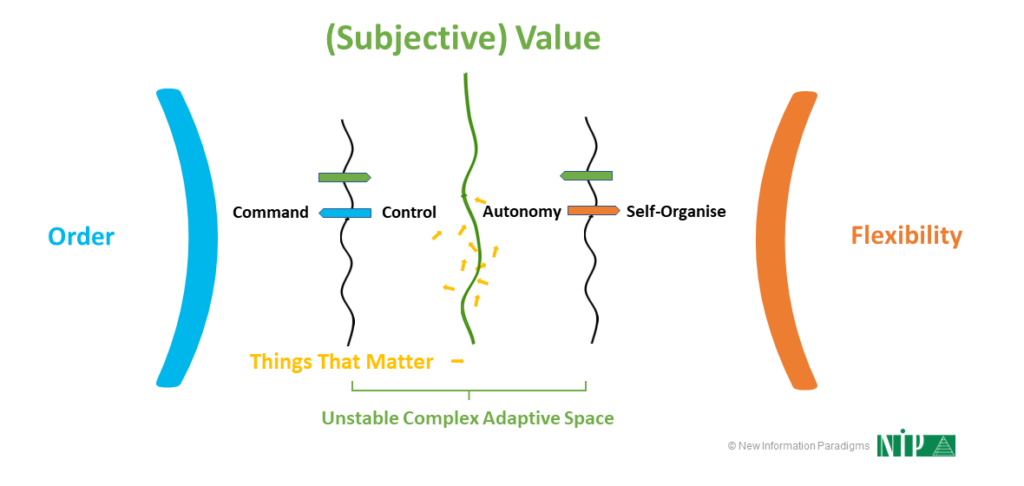Missing the Things That Matter

The Things That Matter are everything valuable in achieving an outcome, but whilst people think they’re focused on them, they’re not. This is because they are being let down by existing approaches and tools, and the results are disastrous.
The main problem in most situations is failure around the Things That Matter.
Things That Matter are the specific aspects of what constitutes Value, i.e. anything and everything involved in achieving an outcome (whether making an improvement, overcoming an issue, or maintaining the status quo).
They are found in the Complex subjective value “space” between the potentially competing “poles” of 1. order, structure and control, and 2. flexibility, creativity and autonomy.

People Aren’t Focused on the Things That Matter
When asked, most people will assume that it is the Things That Matter that define and guide what they are doing.
However, ask them what these things are, and at best they come up with vague answers, which are likely different from those their colleagues would give – much less, in a relationship situation, their counterparts within the other party.
Why? Because the contracts, processes and measures that dominate management tend to focus on the tangible and objective.
After all, whilst subjective Things That Matter are emotionally important – often critical – it is hard to know what to do with them: it usually isn’t clear how to measure them, or what actions could be taken to address them.
Things That Matter Are Being Ignored
Therefore, even in the relatively rare cases where an attempt is made to express subjective Things That Matter – if not in the contract then often in an MOU or “behavioural charter” – they are:
- Typically very high-level: broad goals like “double sales within two years” or statements of corporate values that express a commitment to things like “integrity“, “respect“, “ambition“, etc… but with little to no detail of what they mean in practice.
- Mostly mentioned as aspirations: assertions of priorities, or of some things that need to happen, but with little or nothing to back them up.
- A source of frustration rather than inspiration, such that they are disregarded in practice.
- Lost in the “noise” of communication around more “tangible” goals and milestones.
Worse still, they are usually expressed exclusively by senior management, which means they are:
- Incomplete, as many key Things That Matter are ‘locked in’ to the minds of front-line staff who are closer to the end customer and to their relationship counterparts.
- Seen as imposed on the situation, rather than collectively “owned” having emerged from the experience of those involved in it.
More commonly, though, Things That Matter are simply left implicit and unstated.
This is a Disaster
The result?
People are not properly aligned with each other on the Things That Matter – at worst at odds with each other – with invisible and unresolved perception gaps that work against effectiveness, and differences in priorities or approach not discussed or managed.
Most of the most important aspects of the situation are therefore not being addressed.
No wonder that the Symptoms of What’s Not Working soon follow.

